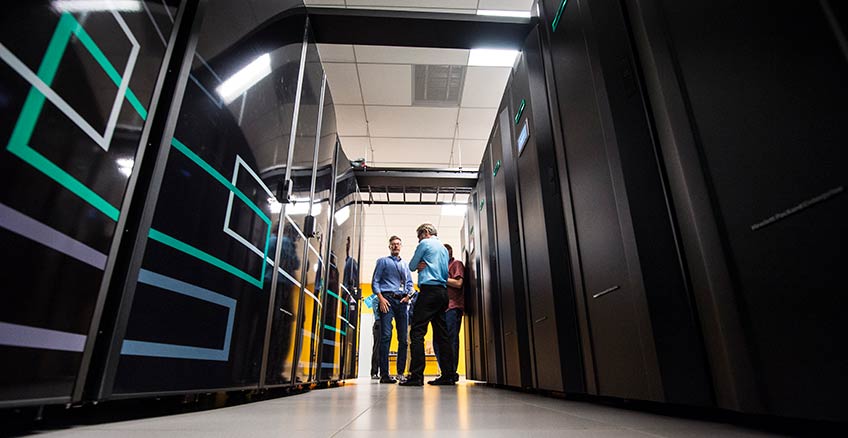NREL and HPE Team Up to Apply AI for Efficient Data Center Operations
Collaborative Research Effort Will Apply Artificial Intelligence and Machine Learning Approaches to Improve HPC Data Center

Artificial intelligence (AI) is the latest buzzword in energy innovation—and when it comes to operating energy-intensive data centers, AI could be the key to improved efficiency.
That's why the National Renewable Energy Laboratory (NREL) has partnered with Hewlett Packard Enterprise (HPE) on a new research effort that will evaluate how applying AI in NREL's Energy Systems Integration Facility (ESIF) High-Performance Computing (HPC) Data Center could improve operations.
"HPC data centers will increasingly need to rely on automation to keep pace with exascale growth in compute capability and to manage and optimize the data center environment and facility resources,” said NREL Computational Science Center Director Steve Hammond. "Exascale refers to HPC systems capable of at least a billion billion calculations per second."
By learning historical trends and training models to operate on real-time data collected from the systems and facilities, AI and machine learning (ML) approaches could improve HPC data center operational efficiency as supercomputers approach exascale capability.
The new NREL-HPE partnership brings together existing research efforts from both parties toward collaborative, innovative solutions that could have major industry impact.
"HPE's Advanced Technology Group has conducted comprehensive research on exascale monitoring and management for HPC systems," said NREL Data Analysis and Visualization Group Manager Kris Munch, who leads the NREL project team. "And NREL has developed methods to collect, aggregate, and stream real-time data in the ESIF HPC Data Center, so we have a significant data set of relevant metrics across compute systems, racks, environmental, building and utility sources that can be used to research various predictive analytics problems."
NREL and HPE will join forces to add AI to NREL's existing real-time data collection/aggregation/streaming system and HPE's data monitoring/management system. The team will evaluate how this approach improves the operational efficiency of the NREL ESIF HPC Data Center through analytics on both historical and real-time data from IT systems and facilities operations.
"Our research collaboration will span the areas of data management, data analytics, and AI/ML optimization for both manual and autonomous intervention in data center operations," Munch said. "We're excited to join HPE in this multiyear, multi-staged effort—and we hope to eventually build capabilities for an advanced smart facility after demonstrating these techniques in our existing data center."
The project represents the continuation of NREL's ever-expanding partnership with HPE. Most recently, NREL announced in August a memorandum of understanding to collaborate with HPE on the application of edge and data-centric computing to solve complex energy system challenges. Before that, NREL worked with HPE to develop two ultra-efficient supercomputers: the laboratory's latest supercomputer, Eagle, and its predecessor, Peregrine.
Learn more about computational science at NREL.
Last Updated May 28, 2025
